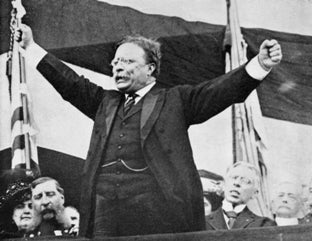The Building Blocks of “You Didn’t Build That”
Rich Tucker /
Tuesday is “We Built This” night at the Republican National Convention. “The GOP is turning what some see as a presidential slight aimed at business owners and entrepreneurs into a theme,” reports Fox News.
That slight, of course, was contained in some off-the-prompter remarks President Obama made during a speech in Roanoke, Virginia, last month:
[L]ook, if you’ve been successful, you didn’t get there on your own. You didn’t get there on your own. I’m always struck by people who think, well, it must be because I was just so smart. There are a lot of smart people out there. It must be because I worked harder than everybody else. Let me tell you something—there are a whole bunch of hardworking people out there.
If you were successful, somebody along the line gave you some help. There was a great teacher somewhere in your life. Somebody helped to create this unbelievable American system that we have that allowed you to thrive. Somebody invested in roads and bridges. If you’ve got a business—you didn’t build that. Somebody else made that happen. The Internet didn’t get invented on its own. Government research created the Internet so that all the companies could make money off the Internet.
Obama’s comments are hardly new, however. They merely channel another self-proclaimed progressive from more than a century ago.
“The absence of effective state, and, especially, national, restraint upon unfair money-getting has tended to create a small class of enormously wealthy and economically powerful men, whose chief object is to hold and increase their power,” Theodore Roosevelt announced in Osawatomie, Kansas in 1910. The anniversary of that speech is Friday—coincidentally, right between this year’s conventions.
Roosevelt, aka TR, added that it was acceptable to earn lots of money—as long as the earner would put that money to use in ways the government approved of. “The prime need is to change the conditions which enable these men to accumulate power which it is not for the general welfare that they should hold or exercise. We grudge no man a fortune which represents his own power and sagacity, when exercised with entire regard to the welfare of his fellows.”
TR used the speech to lay the groundwork for his unsuccessful third-party presidential bid two years later.
Heritage’s Matthew Spalding explained earlier this year:
By turning to TR’s New Nationalism model, Obama has revealed once and for all that the intellectual antecedent of his administration is the progressive theory of governance. He is calling his party back to its most radical roots. His objective as president is to complete the progressive transformation of America, and define its next phase as assuring not equal opportunity, but “fair” outcomes, by redistributing wealth and benefits through an ever more complicated and extensive government that regulates more and more of the economy and society.

